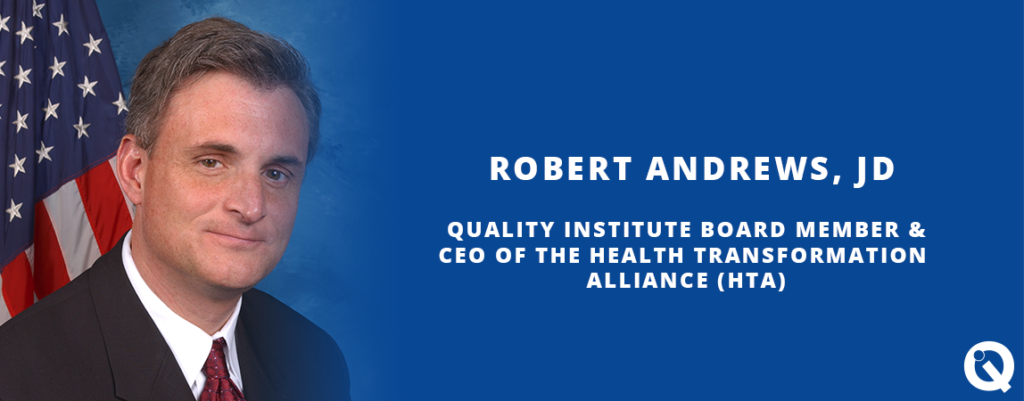Rob Andrews, a former member of the U.S. House of Representatives for 24 years, currently serves as the CEO of the Health Transformation Alliance (HTA). Andrews is a board member of the Quality Institute and will be the keynote speaker at the December 1st, Quality Institute All Council Conference, Election Results 2020 Insider Briefing: Implications on Our Health Care System.
What are larger employers and health care purchasers most concerned with right now — and what would they like to see from the next administration?
They want to see policies that foster an environment where more people are healthy more often. American employers are spending hundreds of billions of dollars a year on health services and we do not feel like we are getting hundreds of billions of dollars a year worth of value. So, the person with type 2 diabetes who could manage her care through exercise and nutrition does not — and winds up having a stroke or a heart attack. The mom who could deliver a perfectly healthy baby in a very healthy way ends up with a very difficult delivery and the baby in the NICU. We want to change that…We’re not interested in the cheapest mammogram. We are interested in the most accurate mammogram that can help prevent a catastrophe for a patient later on.
You were instrumental in the passage of the Affordable Care Act. What needs to change now to improve the law?
We need premiums to be lower. I would like to see more states adopt Medicaid expansion so some of the most difficult people to reach have insurance. And I would like to see a greater emphasis on fee-for-value for providers as opposed to fee-for-service. The Medicare program right now has done some creative innovations in bundled payments, in things like the hospital readmission rule, which have positively affected the way providers operate. I would like to see more of those kinds of changes embedded in the Affordable Care Act.
In a post-election Washington, D.C., what is the likelihood of those ideas being enacted?
To the extent the ideas could be done without legislative change, the probability is high, because the incoming administration, I believe, is very sympathetic to what I just articulated. I think that the Biden administration can creatively use administrative tools to achieve these goals.
The likelihood of large-scale legislation passing is slender, though, because of the closeness of both the House and the Senate for the next few years. There are various scenarios ahead based on the Georgia special elections in January. What we are certain of is that neither side is going to have a clear majority in the House or the Senate, which means in the absence of broad bipartisan cooperation legislation will not pass. Given the pitched battle we have over health care, I would say it is unlikely that large-scale legislation would pass.
You are keynote speaker of the Quality Institute’s Winter Conference on December 1st. What are the issues you most look forward to discussing with our members?
I am looking forward to discussing ways that players in the health care system – outside of the United States Congress — can bring positive change. So, hospitals, employers, advocacy groups. Again, I think there is a limited opportunity for statutory change, because of the political division. But that does not mean there’s not an opportunity for positive change. I am not putting a ceiling on what I think we can accomplish. And I want to talk about ways that I think groups like the Quality Institute can catalyze that change.
So, I’m going to offer essentially three ideas: A governmental forecast of what is — and is not — possible, or likely. A set of suggestions about what those of us who are not in the government can do to improve health care. And then talk on the importance of data transparency to any of those projects that we could undertake together.
On transparency, you cannot solve a problem if you can’t properly define it. So, what are people paying for knee replacements and C-sections? What are the outcomes of various providers for those procedures? How much of a margin are pharmacy benefit manufacturers and insurance companies making on the process right now?
The Quality Institute’s work on prenatal care is indicative of what could be done. So is the Mayors Wellness Campaign. Our members at HTA typically spend 40 percent of their annual health care spend on diabetes, knee replacement, hip replacement, or spinal fusion. So even marginal gains by having more people walk during lunchtime or pick the salad instead of the hamburger can make a huge difference in the health care system.
We do not want to create a nanny state that dictates everyone’s behavior. We certainly want to create an intelligent state where consumers know the consequences of choices, are incented to make better choices, and are rewarded when they do.
We like to add a question that gives our readers insight into your passions outside of work. Where would we find you on a sunny day when there is no work or cell phone around?
Swimming with my family. My wife Camille and I love to swim. So does her mom, who is 87 and very healthy, and our daughters when they are here with us. We love family recreation time, where we can exercise together. And I love the Virtua Fitness Center in Voorhees. Exercise to us is not a demand. It is a pleasure.

